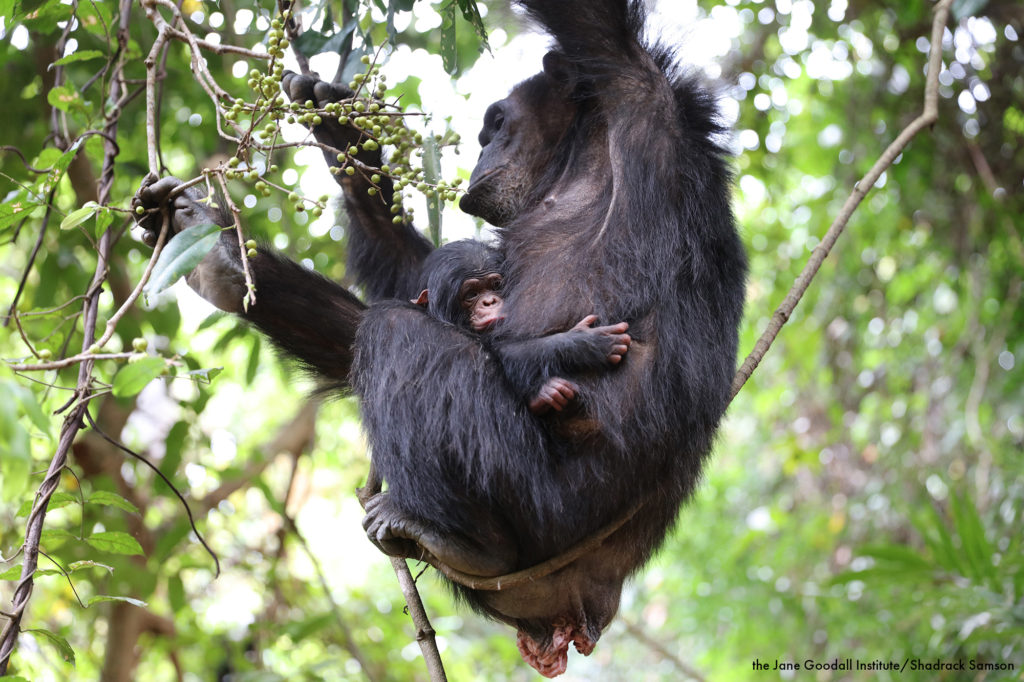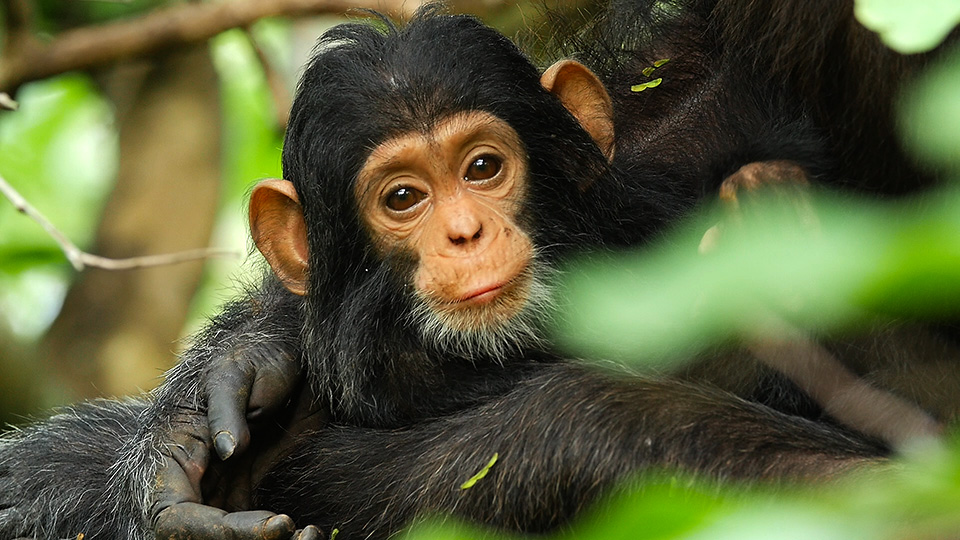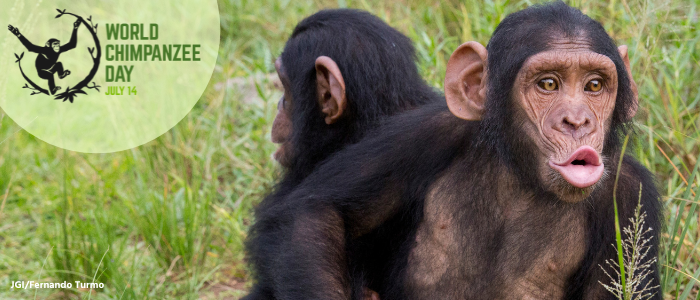Chimpanzees are our closest living relatives in the animal kingdom…but you may already know that! What you may not know is that they are incredibly unique, dynamic, and that we learn more from them every single day. Every year on July 14th, we celebrate our great ape cousins by honoring all the ways that they are innately valuable, essential to ecosystems, and deserve our respect. This year, Dr. Jane Goodall and the Jane Goodall Institute global chapters are sending out a Pant-Hoot (chimpanzee calling) to celebrate chimpanzees and use our voices to stand up for our closest living relatives!
World Chimpanzee Day unites people all around the world in celebrating the incredible wonder and importance of chimpanzees. The day honors the anniversary of when 26-year-old Jane Goodall first stepped foot onto the shores of Lake Tanganyika in Gombe, Tanzania in 1960 to study these mysterious and incredible beings. Jane’s insights that chimpanzees make and use tools, are compassionate, have dynamic personalities and intelligence, and deserve our respect transformed the scientific landscape, forever redefining our relationship to other animals.
As Jane has shared, “we are not different in kind, but rather by mere degree.” This research in Gombe, Tanzania, continued today through the Jane Goodall Institute, is the longest running wild chimpanzee study in the world – 60 years and going. For over half a century, this work has provided tremendous insights in the fields of ecology, animal behavior, health, and so much more.

For World Chimpanzee Day 2021, we celebrate all the fascinating ways chimpanzees are so like us, and yet so unique! From their ability to form complex relationships and bonds to their extraordinary use of communication, from their essential role in rainforests as seed dispersers to their individual personalities and stories – chimpanzees are truly one-of-a-kind. As we celebrate all the ways in which they are extraordinary animals and our closest cousins in the animal kingdom, we also look for ways to encourage their conservation and improved welfare worldwide. Through collaborations between individuals, NGOs, governments, and corporations, we can grow understanding, compassion, and improved wellbeing for chimpanzees.
Chimpanzee Facts
Chimpanzees are Unique
- Chimpanzees communicate within their groups by making different vocalizations during play, hunting, and when making threats.
- Chimpanzees move by knuckle-walking on the forest floor or swinging from branch to branch in the trees.
- Male chimpanzees put on displays by screaming and throwing branches and leaves to intimidate other males and appear more dominant.
- Chimpanzees can be emotionally distinct from each other, giving them different personalities.

Chimpanzees are Important
- Because chimpanzees eat mainly fruit, they serve as a forest seed dispersers so that the fruits can continue to grow, making them important for the ecosystem.
- Chimpanzees are key parts of local food chains.
- Chimpanzee behavior and physiology is one of the closest to humans making them extremely important to better understand.
Chimpanzees are the most Similar to humans
- Chimpanzees not only have a large brain like we do, but also a complex brain structure that allows for social behaviors, culture, and higher intelligence. Chimpanzees display emotions such as grief, anger, compassion, and affection.
- When chimpanzees are born, they are dependent on their mother for around 5 years to grow healthy and happy.
- Chimpanzees are vulnerable to human disease because they can catch the same viruses and infections. However, your average common cold can be deadly for a chimpanzee because of the new pathogens being introduced to their immune system.
- Your typical cat or dog rely on smell as their primary sense, but chimpanzees, like us, rely on our developed sense of sight to navigate the world.

Unfortunately, Chimpanzees are endangered on the IUCN’s Red List. At the turn of the 20th century, there were an estimated 1-2 million chimpanzees across 25 countries in Equatorial Africa. Current estimates suggest there are now around 340,000 (high estimate) chimpanzees remaining in only 21 African countries. They suffer due to threats like habitat loss, disease, fragmented populations, and illegal wildlife trafficking. In captivity, many sadly remain in biomedical research facilities around the world, and are kept as illegal pets, in roadside attractions and unaccredited zoos. Together we must work to stop these threats, improve their well-being in captive environments, and save chimpanzees!
TAKE ACTION for Chimpanzees
There are so many ways to #GiveaPantHoot for chimpanzees!
- LEARN Visit our website and wiki, and worldchimpanzeeday.org
- RESPECT Think twice before you like that social post! Often social media and media depictions of chimpanzees are exploitative and harmful. You can make a difference learn more and use our imagery guidelines here.
- GIVE
- You can also sign up to become a Chimpanzee Guardian to support the care of our rescued chimpanzees, survivors of the illegal pet or bushmeat trade.
- Sign up for our Gombe Science Heroes program! You’ll get your assignment in following along with groundbreaking research in Gombe, now the longest running wild chimpanzee study in the world!
- Support our community-centered chimpanzee conservation programs here.

#GiveaPANTHOOT
Pant-Hoot with us for WCD!
Chimpanzees greet one another using a vocalization known as a “Pant-Hoot,” something Dr. Goodall does at every one of her lectures. Record your best Pant-Hoot and post to social media tagging #WorldChimpanzeeDay @janegoodallinst ahead of July 14th for a chance to be featured on the day!
- Share your knowledge and ways to take action with your friends and family on social tagging #WorldChimpanzeeDay #GiveaPantHoot @janegoodallinst!
- Example social messages:
- Twitter “On July 14 1960, Dr. #JaneGoodall @janegoodallinst entered Gombe, Tanzania to study the lives of wild #chimpanzees. Join me in celebrating #WorldChimpanzeeDay, to honor these highly complex beings & ignite action to protect them. worldchimpanzeeday. org“
- Facebook “Did you know chimpanzees share nearly 98.6% of their genes with humans? Through the groundbreaking research of @Jane Goodall and those scientists that followed her, we now know so much more about all of the behaviors we share with our great ape cousins. Join me and @janegoodallinst in celebrating #WorldChimpanzeeDay on July 14th! www.worldchimpanzeeday.org

The Jane Goodall Institute is a global community conservation organization that advances the vision and work of Dr. Jane Goodall. By protecting chimpanzees and inspiring people to conserve the natural world we all share, we improve the lives of people, animals and the environment. Everything is connected—everyone can make a difference.







